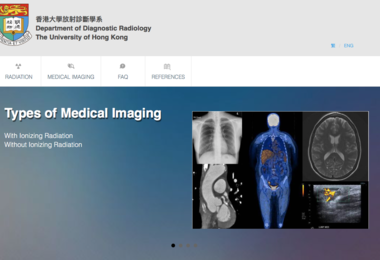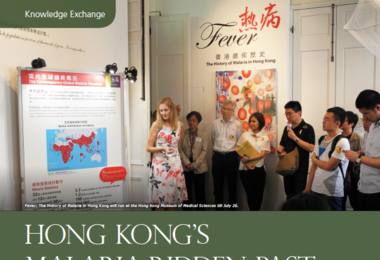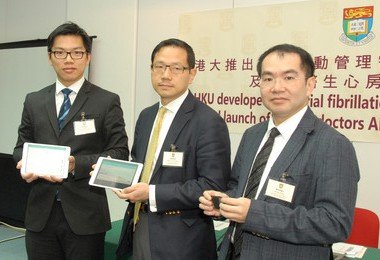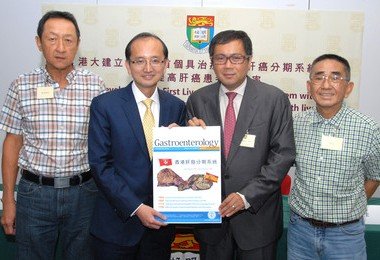KE Spotlight
Filter
-

HKU Department of Diagnostic Radiology launches a new knowledge exchange website: Medical Imaging and Radiation
The "Medical Imaging and Radiation" website, developed by the Department of Diagnostic Radiology and supported by the Knowledge Exchange (KE) Funding Scheme, has been launched. This website is intended to serve as an e-resource for public from all walks of life, focusing on medical imaging and its relationship with radiation. The website consists of sections on introduction to radiation, various imaging modalities and useful tips that will assist individuals in the process of decision-making when considering imaging test. The website aims at benefiting both professionals and patient groups, and anyone with an interest in radiation and medical imaging.
Read More -

Hong Kong's malaria-ridden past
A KE-funded exhibition titled Fever: The History of Malaria in Hong Kong, co-presented by the Centre for the Humanities and Medicine of HKU and Hong Kong Museum of Medical Sciences, revisits Hong Kong's battle with malaria in the past and alerts people to the prevalence of the disease in other parts of the world.
Read More -

HKU Faculty of Medicine presents new book on Dissecting the Meaning of Life: An Anthology of Essays on Body Donation
The HKU School of Biomedical Sciences Division of Anatomy joined hands with the Medical Ethics and Humanities Unit to present a new bilingual book, Dissecting the Meaning of Life: An Anthology of Essays on Body Donation. Included in the book are essays written by medical students reflecting on their dissection experience and their relationships with their Great Body Teachers, and the book is dedicated to all the body donors and their families over the past 40 years. A book launch was held where writers and medical students shared their views on body donation and anatomy dissection.
Read More -

HKU Youth Quitline marks its tenth anniversary in helping young smokers
The youth-oriented smoking cessation hotline "Youth Quitline", jointly established by the Smoking Cessation Research Team at the HKU Faculty of Medicine, the Department of Social Work and Social Administration, and the Hong Kong Council on Smoking and Health has since 2005 received over 7,000 telephone inquiries, provided smoking cessation counselling for 1,591 youth smokers. As of January 31, 2015, the smoking cessation rate after joining the programme for six months was 23.6%.
Read More -

HKU Medical Faculty develops new atrial fibrillation management app and launches AF screening programme
The HKU Department of Medicine has initiated two new measures for management of stroke prevention in patients with atrial fibrillation (AF), namely the AF management app and private doctors AF screening programme. HKU AF CAL is a free new mobile app designed to help doctors managing their patients with atrial fibrillation. By using the five clinical calculators, doctors can assess the ischemic stroke risk and major bleeding risk of patients with AF, and assessing the quality control of anticoagulation for those patients on warfarin. The research team will in phase road-show 18 regions in Hong Kong providing certificate course for up-to-date AF management to private doctors. The team will recruit 1,000 private doctors to perform AF screening and the ultimate goal is to reach 100-150 thousands of high-risk patients and provide them with proper treatments.
Read More -
Knowledge Exchange Awards 2014
The Faculty Knowledge Exchange (KE) Awards were introduced in 2011 in order to recognize each Faculty's outstanding KE accomplishment that has made demonstrable economic, social or cultural impacts to benefit the community, business/industry, or partner organizations. Following the successful launch of the Faculty KE Awards, the KE Award (Non-Faculty Unit) was introduced in 2012 with the same objective for the independent centres, institutes and units of the University. Results of the 2014 KE Awards are now available.
Read More -

HKU develops Asia's first liver cancer staging system with treatment guidelines to improve survival rate of liver cancer patients
HKU Surgery Department and Queen Mary Hospital have developed a five-stage liver cancer staging system with treatment guidelines - the Hong Kong Liver Cancer (HKLC) staging system. By introducing better prognostic classification and newer, more aggressive treatment strategies than the existing four-stage Barcelona Clinic Liver Cancer (BCLC) staging system, the HKLC staging system yields a better survival outcome and cure rate for liver cancer patients. The launch of the HKLC staging system also represents a major new direction in the field of liver cancer, offering clinicians a more valid and reliable approach to determine treatment for liver cancer patients in different stages. The HKLC staging system has already received widespread international recognition and is expected to replace the BCLC as the new standard guideline for treatment of liver cancer worldwide.
Read More

